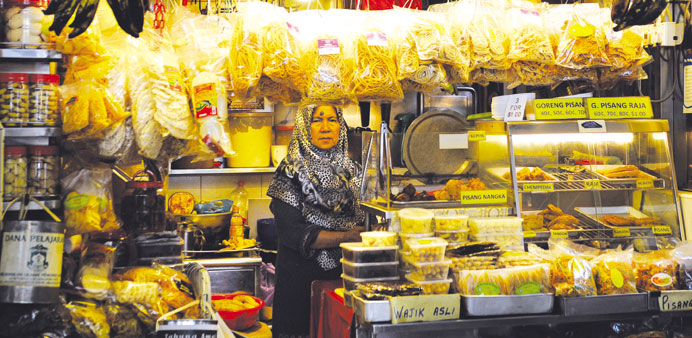A woman sells halal food in a market in the area of Little India in Singapore. The $700bn global halal food market is now becoming one of the most important trade channels between the Middle East and Asia.
By Arno Maierbrugger/Gulf Times Correspondent /Bangkok
The global halal food market, valued at around $700bn in sales per year and constantly growing, plus other halal consumer products such as cosmetics, pharmaceuticals and healthcare products, is increasingly becoming one of the most important trade channels between the Middle East and Asia, it turned out at the Malaysia International Halal Showcase, a leading annual halal-centred exhibition, this year held from April 9 to 12 in Kuala Lumpur.
The exhibition was focused on strengthening ties between Malaysian halal producers – the country has one of the most buoyant halal industries in the world – with international producers, traders and other industry players such as retailers.
The interest was strong from the Middle East, but also non-Muslim Asian countries such as Thailand, South Korea, Japan and China.
Saudi Arabia had the highest participation in the exhibition with 44 companies and also strongly promoted Saudi products at the event and pushed for reconciling global halal organisations under one umbrella in order to unify products and increase consumer confidence. Saudi investors also showed interest in venturing into halal production in Malaysia.
The UAE offered Malaysia a “gateway to the Middle East” for halal products through its Ras Al-Khaimah Free Trade Zone, from where Malaysian halal goods could be shipped tax-free to high-value halal markets in North Africa, the Middle East and Europe.
And the trade volume could be significant: Malaysia was the world’s largest exporter of halal goods valued over $11bn, primarily processed food and beverages, in 2013.
Qatar last year expressed intentions that it would be interested in investing in the Tanjung Manis Halal Hub in Sarawak, Malaysia’s largest state, to benefit from the hub’s strategic location in the centre of Southeast Asia.
Behind the impressive growth of the global halal market stands not only the fact that the Muslim population is fast growing in numbers and has already reached a massive consumer base of 2bn people or about 23% of the global population. But what further drives the sector is that halal food and related products are becoming more mainstream also for non-Muslims, and this beyond its religious connotation.
“Purchasing halal products is increasingly becoming a lifestyle choice for many non-Muslims,” said Hani al-Mazeedi, representative of the Kuwait Institute for Scientific Research, at a press conference at the exhibition. “The growing popularity of halal products and services worldwide can bridge civilisations to promote greater interfaith understanding,” he added.
Room for growth also becomes obvious when it is taken into account that the current production capabilities of the halal industry are only able to serve 20% of the global demand. Adding to this, a number of industrialised non-Muslim countries have opened to the halal market, among them the UK, France, Belgium, the Netherlands, Brazil, Japan, Australia and New Zealand.
As an example, adaption of halal in Shinto-dominated Japan is on a sharp rise, with the country having established its own halal association and a number of food producers including food giant Ajinomoto that introduced halal product lines or are set to open halal factories in Southeast Asia such as fragrance maker Takasago.

